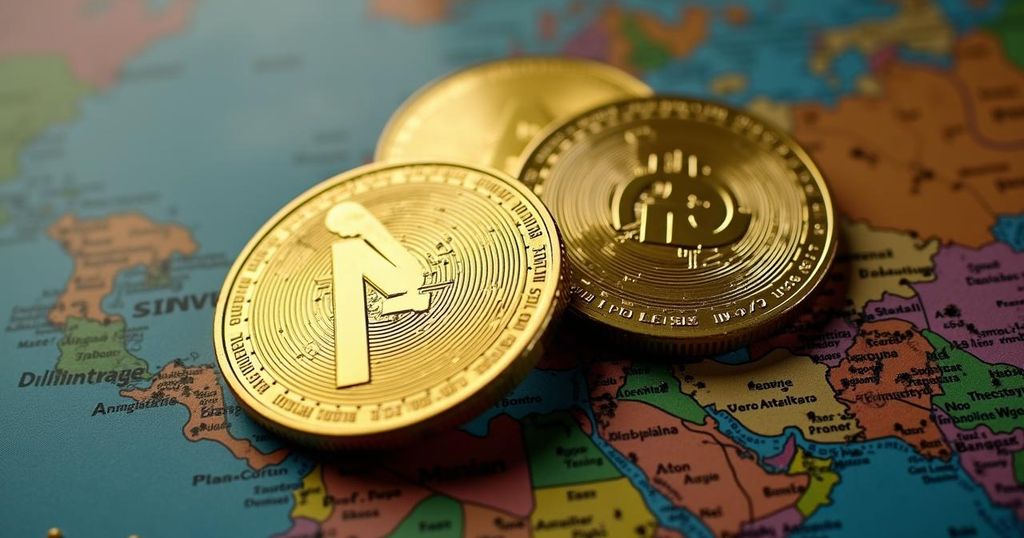Argentina and Venezuela are increasingly adopting stablecoins as a solution to rampant inflation and currency devaluation. Stablecoins have gained popularity, particularly in Argentina where inflation reached 143% by the end of 2023. In Brazil, institutional interest in stablecoins has surged, driven by regulatory advancements and the introduction of cryptocurrency ETFs. The trend underscores a broader reliance on stablecoins as financial alternatives amidst regional economic instability, with the Caribbean also observing growth in blockchain-related activities post-FTX.
In recent years, economic instability and hyperinflation across several Latin American countries, notably Argentina and Venezuela, have compelled many citizens to seek refuge in stablecoins—cryptocurrencies designed to maintain a stable value against fiat currencies, primarily the U.S. dollar. Reports indicate that Argentina’s inflation rate soared to 143% by late 2023, prompting individuals to adopt stablecoins as a safeguard against the depreciating peso. In Venezuela, similar trends are observed with the bolívar diminishing in value; stablecoins have emerged as a crucial alternative for safeguarding financial resources among the populace. Brazil, meanwhile, has witnessed a notable institutional resurgence in cryptocurrency trading, especially involving stablecoins. After a lull earlier in the year, institutional transactions saw a substantial 48.4% increase by the first quarter of 2024. This uptick is attributed to both an evolving regulatory environment and the introduction of cryptocurrency exchange-traded funds (ETFs), which have attracted significant attention from prominent financial organizations. The role of stablecoins has become increasingly significant within the Latin American financial landscape, facilitating cross-border transactions and functioning as viable stores of value amid rampant inflation. Companies such as Circle have responded to the burgeoning demand for U.S.-dollar-pegged stablecoins in Brazil, signifying a broader trend across Latin America as both individual and institutional investors pivot towards these stable digital assets. Additionally, in the Caribbean, a post-FTX bankruptcy landscape suggests an upswing in blockchain-related business formations, with an observable rise in international clientele engaging in various blockchain applications. David Templeman, a specialized financial investigator at the Cayman Islands Bureau of Financial Investigation, emphasizes the growing presence and legal domiciling of blockchain and Web3 companies in the region, reflecting the Caribbean’s evolving role as a significant hub for blockchain adoption and development. As the economic landscapes in Argentina and Venezuela remain fraught with uncertainty, stablecoins are increasingly recognized as essential tools for both individual and corporate financial stability moving forward. In Brazil, growing regulatory clarity and the institutional acceptance of cryptocurrencies signal a burgeoning confidence in crypto assets as integral components of the mainstream financial system.
The rising adoption of stablecoins in Latin America has sparked critical interest due to the region’s ongoing economic challenges, particularly hyperinflation and currency depreciation affecting several nations. In Argentina and Venezuela, the local currencies’ diminished value has led individuals to seek more stable financial solutions through the use of stablecoins. Brazil’s regulatory advancements also catalyze a growing institutional interest in cryptocurrencies, marking a significant shift in the region’s financial landscape and the potential for further cryptocurrency integration within mainstream markets. The Caribbean, experiencing an increase in blockchain enterprises post-FTX, supports the idea that stablecoins and blockchain technology may offer innovative solutions to economic issues.
The increasing reliance on stablecoins in Argentina and Venezuela reflects a broader trend where individuals and businesses are seeking reliable financial instruments amid economic turmoil. In Brazil, the institutional shift towards cryptocurrency adoption, supported by favorable regulatory conditions, indicates a burgeoning acceptance of digital assets. The Caribbean’s growing blockchain ecosystem further underscores the potential for innovation in financial solutions within the region. Collectively, these developments suggest that stablecoins could play a pivotal role in stabilizing economies facing hyperinflation and currency devaluation throughout Latin America.
Original Source: www.crypto-news-flash.com






